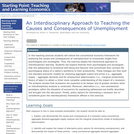
In this teaching exercise students will extend the conventional economic framework for analyzing the causes and consequences of unemployment to incorporate insight from psychologists and sociologists. Thus, the exercise adopts the hierarchical approach to interdisciplinary learning. Students will explore theories from psychologists and sociologists that link joblessness to emotional well-being and discover how economists then connect the psychological status of a nation's workforce to their productivity. These linkages are then built into standard economic models for analyzing aggregate output and prices (i.e., aggregate supply aggregate demand) and for employment determination (i.e., marginal productivity theory of labor) to obtain a richer more complete understanding of the impact of a recession. The analysis reveals that recessions are expected to be deeper and of greater duration when an interdisciplinary analysis is conducted. Moreover, alternative (i.e., non-neoclassical) paradigms within the discipline of economics for explaining joblessness are briefly described and brought into the discussion. Finally, policy options for eliminating a recession are re-considered given the interdisciplinary framework offered in this exercise.
- Subject:
- Economics
- Social Science
- Material Type:
- Activity/Lab
- Provider:
- Science Education Resource Center (SERC) at Carleton College
- Provider Set:
- Pedagogy in Action
- Author:
- Art Goldsmith
- Date Added:
- 11/06/2014